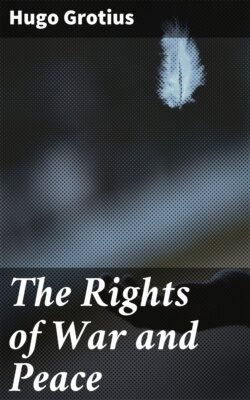Читать книгу The Rights of War and Peace - Hugo Grotius - Страница 4
На сайте Литреса книга снята с продажи.
I. The Reign of War.
ОглавлениеTable of Contents
The idea of peaceful equity among nations, now accepted as a human ideal, though still far from realization, was for ages a difficult, if not an impossible, conception. All experience spoke against it, for war was the most familiar phenomenon of history.
Among the Greek city-states, a few temporary leagues and federations were attempted, but so feeble were the bonds of peace, so explosive were the passions which led to war, that even among the highly civilized Hellenic peoples, community of race, language, and religion was powerless to create a Greek nation. It was reserved for the military genius of Alexander the Great, at last, by irresistible conquest, to bring the Greek Empire into being, to be destroyed in turn by superior force.
The Roman Empire almost achieved the complete political unity of Europe, and bound parts of three continents under one rule, but the corruption of the military power which held it together led to its inevitable dismemberment.
After the conflicts of the barbaric kingdoms which followed the dissolution of the Western Empire were ended by the predominance of the Frankish monarchy, the world believed that the Pax Romana was to be restored in Europe by the hand of Charles the Great; but the disruptive forces were destined to prevail once more, and the Holy Roman Empire never succeeded in reviving the power of ancient Rome. And thus the dream of a universal monarchy, of a central authority able to preside over kings and princes, adjusting their difficulties, and preserving the peace between them, was at last proved futile.
In each of the great national monarchies that had already risen or were still rising on the ruins of imperial dominion, particularly in France, England, Holland, and the States of Germany, a continuous internal conflict over questions of religion complicated the bitterness and destructiveness of foreign wars until Europe was reorganized by the Peace of Westphalia, in 1648.
It was in the midst of these wars that Grotius was born. He saw his own country rising from a baptism of blood and all Europe rent and torn by the awful struggle of the Thirty Years' War, in the midst of which his great work was written and to whose conclusion it served as a guide and inspiration. The Empire, dismembered, had been reduced to almost complete impotence, the Church had been disrupted, and no international authority was anywhere visible. Amid the general wreck of institutions Grotius sought for light and guidance in great principles. Looking about him at the general havoc which war had made, the nations hostile, the faith of ages shattered, the passions of men destroying the commonwealths which nourished them, he saw that Europe possessed but one common bond, one vestige of its former unity,—the human mind. To this he made appeal and upon its deepest convictions he sought to plant the Law of Nations.
